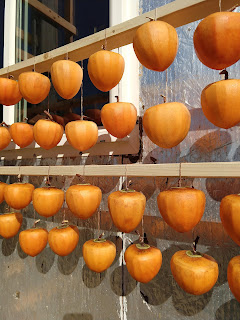The display is full. It is the time of year when summer meets fall. There are still peaches, plums, tomatoes, cucumbers, squash, and peppers. And now we are adding apples, Asian pears, grapes, Jujube, and figs. Soon enough there will be European pears, pomegranates, persimmons and quince.
We have had a gentle summer but this week we will be seeing triple digit temperatures. I'm having trouble keeping up with the cherry tomatoes. For one, I don't much like being out in the hot weather, and two, the heat is encouraging them to ripen quickly. By the time I get out there, many are split or just fall off the vine as I pick adjacent cherry tomatoes. The squash and cucumbers are slowing down. Now they produce smaller fruit that take longer to grow to maturity. I think the vines have worked hard this summer and are getting tired. I hope you were able to get some tomatoes this summer. It seems that the best are gone. The production is slowing down and the tomatoes are getting smaller and not so pretty.
Most of the summer fruit trees are empty. It may appear that this is a non-productive time for them. In fact, they are preparing next year's crop. The twigs are developing buds that will produce flowers in the spring and fruit in the summer. Even though there is no fruit currently on the trees, we continue to water the trees in hopes that the next season will be a good one.
Along with the start of some fall crops, we are starting to prune trees that have finished their production for the year. Some trees need to be lightly pruned before the wet weather sets in. Trees get less disease when pruned during dry weather.
Hours
Tues thru Sat 10:00 am to 6:00 pm
Sunday 11:00 to 5:00
Closed on Mondays
Here is what we have at the Farm Stand from Otow Orchard.
PEACHES
Summerset: Yellow, freestone peach. Juicy and sweet for eating out of hand, baking or freezing. Fine texture. (Limited supply.)
Fairtime: Yellow freestone peach. Red blush over yellow skin. Sweet and juicy. (Limited supply.)
PLUMS
Casselman: Yellow fleshed plum. Very sweet and flavorful. Becomes more sweet and juicy when stored.Empress: Yellow flesh European plum. Often used for baking. (Limited supply.)
FIGS
Brown Turkey: Brown speckled skin with sweet, pink flesh. Mild sweetness with thoughts of honey.
Black Mission: Black skin with tan, caramel flavored flesh. Sweet and chewy.
Panache (Tiger Stripe): Greenish brown striped skin. Very sweet, pink flesh .
JUJUBE
Li jujube: Large sweet and crisp or soft and chewy.
Sugar Cane: Small and very sweet and crisp.
Hoshigaki : These are whole dried persimmons. They were hand massaged while they dried over a period of four to eight weeks. Some are firm, others are soft and moist. All are coated with naturally formed white persimmon sugar. No sugar added and no preservatives used. We strive to make the best hoshigaki without any shortcuts. This takes time and attention during the drying season. A limited supply of Hoshigaki are now available in the farm stand. Contact us for large on-farm pick-up orders. (916) 791-1656 or email at otowochard@yahoo.com. We usually begin processing the new season hoshigaki in October.
Hoshigaki strips: These are pieces of hoshigaki sliced for easy snacking.
Gala Apples: Sweet, crisp apple. Red blush on skin over light yellow skin. Great for snacking.
GRAPES
Thompson Seedless: Small, sweet, yellow grapes.
Kyoho: Large, sweet, purple grapes with seeds. Flavorful and juicy.
ASIAN PEARS
20th Century: Yellow skin. White, crisp flesh. Sweet and very juicy.New Century: Yellow skin. White, sweet, crisp flesh.
Kosui: Yellow skin. White, crunchy flesh. Sweetand juicy
Hosui: Brown rough skin. Very Sweet with crunchy flesh.
EUROPEAN PEARS
Bartlett Pear: Sweet and juicy European pear. Flesh is white with soft texture and mild fragrance. Used for fresh eating, canning poaching and baking. I love mine with a scoop of cottage cheese.
D'anjou Pear: Sweet and juicy European pear. Enjoyed when it is a little firm. Can be eaten out of hand or sliced into cereal or yogurt. May be poached or used in baking. Skin remains on the green side. Ready to eat when neck area begins to soften.
Local Honey Honey 🍯 from bees 🐝 at Otow Orchard. Bee pollen from bees 🐝 at Otow Orchard is also available.
⚘ Calendula Salve and Lip Balm: Wonderfully thick salve for healing dry skin, bug bites and scrapes.
Summer Squash:
Yellow crookneck
Cucumbers:
Armenian: Light and dark green in color. Young cucumbers have few seeds. Background flavor of melon. 
Asian cucumbers: Bumpy or spiny. Long green seedless cucumbers. Sweet, flavorful and often burpless. Melon rind-like flavor.
Lemon cucumber: Small, round, green, tender cucumber unless I wait too long to pick it and it becomes yellow and seedy.
Cherry tomatoes:
Sungold (orange)
Sweetie (red)
Other Vegetables: (Limited supply.)Japanese eggplant
Bell peppers
Shishito peppers
Aoshiso leavesHere is what we have from other producers:
La Bella Vito Farm in Loomis is bringing us fresh🥚 eggs from pastured 🐔🐔chickens. Limited supply.
Fresh Bouquets:
 of colorful in-season flowers from La Bella Vito Farm in Loomis. (Limited supply.)
of colorful in-season flowers from La Bella Vito Farm in Loomis. (Limited supply.)
Kijani Farm in Granite Bay. No spray practice:
Butternut Squash: Sweet nutty winter squash. Orange flesh is concentrated in the neck of this squash.






.jpg)





























